제 1장 초등 영어 교육
영어 교육의 필요성
영어과 교육과정의 변천과 초등 영어 교육
초등 영어 교육의 세계적 추세
초등 영어 교육의 과제
*
1. 영어 교육의 필요성
지구어로서의 영어(English as a Global Language: EGL)
영어 사용자의 세 유형 (Kachru, 1985)
Inner Circle
Outer Circle
Expanding Circle
영어 교육의 필요성
*
2. 영어 교육의 필요성
영어과 교육과정의 변천
초등 영어 교육의 정당성
Age and Second Language Acquisition(SLA)
Biological Consideration
“The Critical Period Hypothesis”
- critical period: a biologically determined period of life when language can be acquired more easily and beyond which time language is increasingly difficult to acquire
- in SLA ‘classic’ argument: a critical point for SLA occurs around puberty, beyond which people seem to be relatively incapable of acquiring a second language(L2)
- in order to examine this issue, we need to look the followings:
*
2. 영어 교육의 필요성
초등 영어 교육의 정당성
Age and Second Language Acquisition
Neurological Considerations
- lateralization of the brain
- different aspects of second language optimally learned at different age
- right-hemisphere participations: the role of the right hemisphere in SLA
Cognitive Considerations
cognitive differences between children and adult language acquisition
- children: not yet in formal operational stage
- lateralization hypothesis: adult: dominance of the left hemisphere
- children: amazingly tolerant of cognitive ambiguities
- L1 children’s practice and repetition: not rote learning but meaningful learning(contextualized and purposeful)
*
2. 영어 교육의 필요성
초등 영어 교육의 정당성
Age and Second Language Acquisition
Affective Considerations
- at puberty the inhibitions are heightened with critical physical, cognitive, and emotional changes
- language ego
- children’s ego: growing, flexible until puberty -> new language: no threat to the ego
Linguistic Considerations
- the interference of first language(L1) to second langauge(L2): adult > children
*
2. 영어 교육의 필요성
초등 영어 교육의 정당성
1) 앞에서 언급된 학문적 배경 + 2) 정치/사회적 이유: 지구어로서의 영어의 중요성, 국가/사회/개인의 필요
초등 영어 교육에 대한 반대 논거
여러분의 견해는?
*
3. 초등 영어 교육의 세계적 추세
초등 영어 교육의 실시 형태
초등학교에서의 외국어(Foreign Language in the Elementary School: FLES) 교육 프로그램
몰입학습 프로그램(Immersion Program)
외국어 경험(Foreign Language Experience: FLEX) 프로그램
각국의 초등 영어 교육 현황
우리나라 초등 영어 교육의 성과와 과제
*
PART I. 초등 영어 교육의 이론
제2장 Communicative Competence and Language Acquisition Theory
Communicative Competence
Language Acquisition Device(LAD) & Critical Period Hypothesis
First Language(L1) Acquisition Theory
Second Language(L2) Acquisition Theory
*
I. Communicative Competence
Language form(structure/grammar)
meaning(function)
Chomsky(1965)
Competence vs Performance
Competence: ‘linguistic competence’(grammatical competence)에 국한
Hymes(1972)
Competence: ‘communicative competence’로 확대
-> the rules of grammar + the rules of use (appropriateness)
*
Example: p. 25-26
*
I. Communicative Competence
Canale & Swain (1985): 제2언어 교육관점에서 ‘communicative competence’를 정의
Components of ‘Communicative Competence’
Grammatical competence
Discourse competence
Sociolinguistic competence
Strategic competence
Intercultural Communicative Competence
*
2. Language Acquisition Device and
Critical Period Hypothesis
아동의 모국어 습득 현상을 설명하기위한 가설
Language Acquisition Device(LAD) 이론(Chomsky, 1965)
linguistic LAD grammatical input (Universal Grammar) competence
In order to be able to explain the child’s mastery of L1 in such a short time despite the highly abstract nature of the rules of language, we can assume that there exist innate properties(LAD)
*
2. Language Acquisition Device and
Critical Period Hypothesis
아동의 모국어 습득 현상을 설명하기위한 가설
The Critical Period Hypothesis (Lenneberg, 1967)
- critical period: a biologically determined period of life
when language can be acquired more easily and beyond
which time language is increasingly difficult to acquire
- in SLA: ‘classic’ argument-a critical point for SLA occurs
around puberty (twelve or thirteen), beyond which people
seem to be relatively incapable of acquiring a second
language
- in order to examine this issue, we need to look at the
followings: neurological, cognitive, affective, linguistic
aspects
*
3. First Language(L1) Acquisition
Acquiring a first language means that the speaker can control the five aspects of the language
Phonology
Vocabulary
Grammar
Discourse
Socio-linguistics
*
영어교재: p. 1-2/ p. 5-6
*
3. First Language(L1) Acquisition
Language Acquisition Theories
Behaviorist theory
Stimulus - response - reinforced - then conditioned(habitual)
Nativist theory
Language acquisition-innately determined, born with a genetic capacity(LAD)
Interactionist(Functional) theory
Linguistic behavior is goal-oriented
Interaction with other people plays an important role in language development
The important role of the learning environment
*
4. Second Language(L2) Acquisition
Second Language Acquisition Hypothesis
The Simplified Input Hypothesis
Krashen(1980)’s Five Hypothesis
Acquisition and Learning
Monitor Hypothesis
Natural Order Hypothesis
The Comprehensible Input Hypothesis
Affective Filter Hypothesis
The comprehensible output Hypothesis(Sw



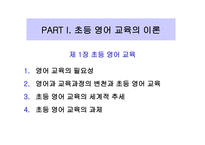
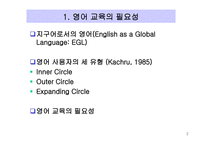
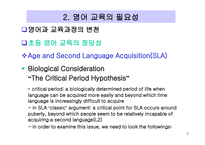
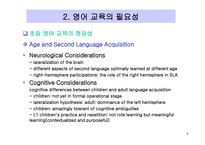
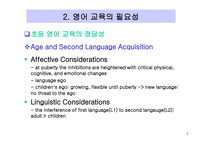
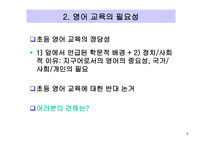
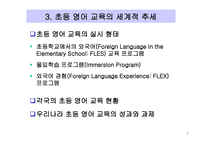
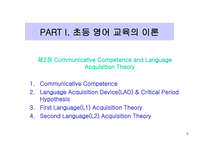
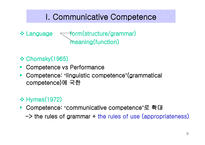
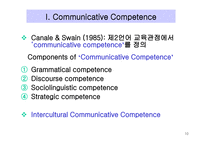
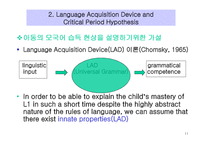
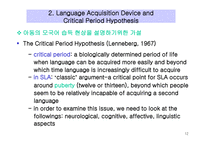
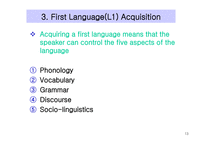
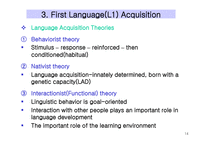
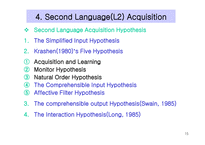
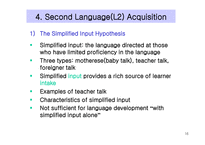
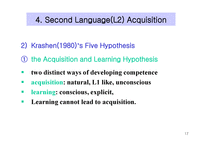
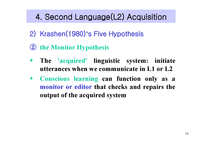
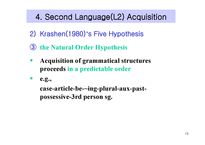
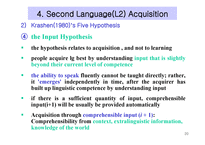
 분야
분야


